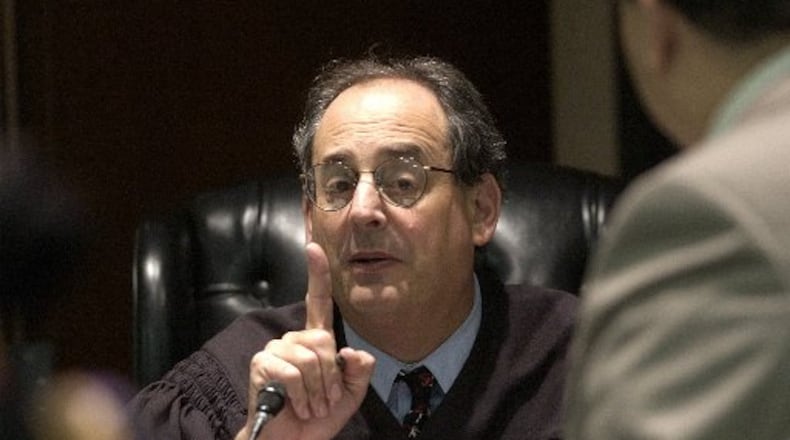Most Georgians know they'll get hammered with hefty fines if they get busted for speeding, driving on a suspended license or possession of marijuana.
But a new, multi-state study demonstrates one reason Georgians must often empty their wallets over a misdemeanor offense: the state's long list of "surcharges" that judges must add to almost every fine.
The Georgia General Assembly, over the years, has approved one add-on after another for various causes. Individually, the surcharges may not add much to the cost of a ticket. But taken together, it's another story.
"By the time you add them all up, you can almost double what your base fine was," said Sarah Shannon, an assistant professor at the University of Georgia who is one of the authors of the study.
Credit: Carrie Teegardin
Credit: Carrie Teegardin
"Monetary Sanctions in the Criminal Justice System" reveals how nine states -- including Georgia -- handle fines. Surcharges are just one part of the in-depth study. But it's an aspect of the justice system that can make Georgia a really expensive place to get busted for a relatively minor crime.
The study found that a Georgian who is fined for driving with a suspended license will likely face surcharges of at least $405 -- on top of a ticket that can range from $500 to $1,000. In Minnesota, where the state doesn't rely so heavily on surcharges, the overall cost would be much less, the study found. For the same offense, a Minnesota driver can expect a fine of $200, with much smaller add-ones: surcharges of $75 and fees of $3 to $13.
Surcharges are usually mandatory charges that judges must impose, so almost anyone who pays a fine also must pay the surcharges. In Georgia, the add-ons have been passed over time to collect money for law enforcement training, brain and spinal injuries, indigent defense, law libraries, retirement funds, drug abuse treatment, victim assistance and other special purposes.
Shannon said court fines are clearly about punishment. "You broke the law, this is what you have to pay," she said.
Surcharges are different, she said, because they're used to pay for government functions that may not always have much to do with the offense that led to the citation.
"It's really a question of 'What is the purpose of those funds? And, is it appropriate to be charging money on top of the fines to fund the system or to fund things that are not related to the criminal justice system?'" she said.
The issue has become even more complex in Georgia, which has a track record of diverting money collected through surcharges to the state's overall budget instead of the special purpose of the surcharge.
While Georgia may stand out for its surcharges, the extra charges are an issue almost everywhere, as are the base costs of the fines that some cities rely on to pump up their budgets.
The issue has been more controversial in recent years, in the wake of a Department of Justice report concluding that police operations in Ferguson, Missouri were focused more on collecting revenue than protecting the public. Ferguson was the site of protests after a white police offer there shot Michael Brown, a black teen who was not armed.
Many judges in Georgia aren't fans of all the surcharges they must add to fines they impose.
Atlanta Municipal Court Judge Gary Jackson said he goes to great lengths in his courtroom to explain to defendants that he has no control over the surcharges and that the extra money collected goes to the state, not the city of Atlanta or other municipalities.
Jackson, who is also president of the state's Council of Municipal Court Judges, said that in his court the state-mandated surcharges add about 40 to 45 percent to the cost of a simple traffic ticket. On some offenses, he said, the surcharges exceed the amount of the actual fine.
"I have a great distaste for state surcharges because they are diverted away from the programs promised to be funded by these surcharges," he said.
In his courtroom, Jackson said, he has heard the surcharges described as "creative accounting, legalized embezzlement and phantom earmarks."
The other states included in the study are California, Illinois, Minnesota, Missouri, New York, North Carolina, Texas, and Washington.
Georgia also stands out from some other states, the researchers noted, because traffic offenses are classified as criminal offenses. Many other states have decriminalized minor traffic offenses. Because the offenses are considered criminal, the researchers found, Georgians face not only large fines, but also the possibility of probation. Defendants in Georgia who cannot afford to pay their fines on the day they come to court are often placed on misdemeanor probation while they pay off their fines.
The researchers noted changes that Georgia has made in its misdemeanor probation system to address abuses.
Now that the legal review has been published, the research team will move on to its next phase of study which will examine how the legal systems actually work in courtrooms across the country. In Georgia, that work will involve observing courts and interviewing those who are involved in cases, with a special eye on finding out whether the reforms are making a difference as defendants appear before judges in Georgia's courtrooms.
About the Author
Keep Reading
The Latest
Featured





